10 Best PHP Frameworks Compared (2023)
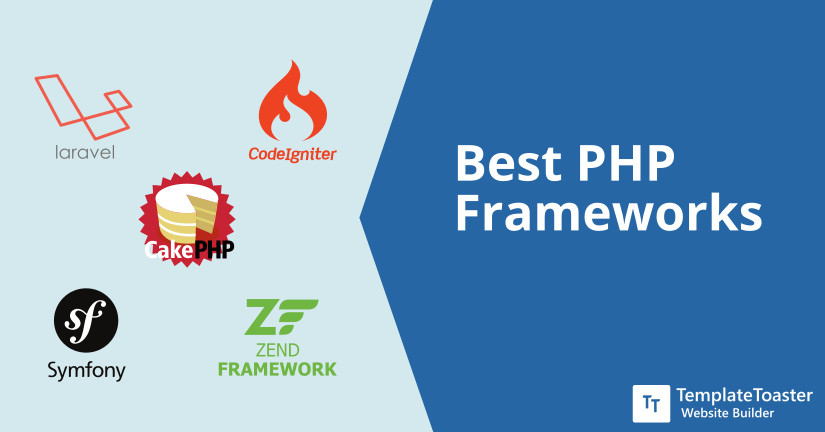
If you are looking for PHP frameworks, you have come to the right place. The information given in this article about the Best PHP Framework is beneficial for beginners as well as professional programmers. We are going to discuss in detail the best PHP frameworks so you can make the right choice for your upcoming project.
PHP is a popular framework which the most widely used server-side programming language to build dynamic websites as well as applications. Significantly writing the PHP script from scratch can be tough and time-consuming. Because in a few cases, you may have to re-write the function.
However, with the help of the PHP framework you can facilitate these processes and improve the workflow. The best PHP frameworks offer the resources to simplify the process of the web development process, which includes pre-built codes, libraries, and various components to prevent repetitive coding. In this article, we will discuss in detail the best PHP frameworks and their technical and conditions, that you can use for web development.
What is a PHP Framework?
The PHP framework is a platform with pre-built modules and reusable code for faster and better performance website design and development. PHP framework uses RAD (Rapid Application Design) software development methodology for repetitive coding. Above all, how much and what is PHP capable of is quite evident with the rapid advancement in this technology. So a PHP framework provides the resources or components to start a project. The PHP frameworks include libraries that consist of the most widely used functions in PHP, so you can avoid manual coding to a great extent. So you can speed up the development process.
Why do we need PHP Frameworks?
PHP frameworks are termed as a common platform that allows users to build web applications with distinct sizes and complexities. It provides a basic structure to build your website with. The set of files that are formulated in a way that they make the development process simpler. And using ensures the efficiency and security of your project.
It is an essential part of web development, so, choosing the correct framework becomes a significant decision here. Although there are various types of PHP frameworks available in the market. Here at TemplateToaster website builder software, I have enlisted the best PHP frameworks. Let’s check them out.
List of PHP Frameworks for Beginners
- Laravel
- Symfony
- CodeIgniter
- Yii
- CakePHP
- Slim
- Phalcon
- PHPixie
- Laminas (Zend Framework)
- Fat Free Framework
- FuelPHP
- Zend framework
Best PHP Frameworks Compared (2023)
| PHP Frameworks | Ease of Use | Minimum PHP Version Requirement | Compatible Operating Systems | Supported Databases |
| Laravel | Easy | 8.0 | macOS, Linux, Windows | MySQL,PostgreSQL,SQLite,SQL Server |
| CodeIgniter | Easy | 5.1.6 or newer | Linux, Windows | PostgreSQL, MySQL, SQLite |
| CakePHP | Simple | 7.3 | Linux, Windows, macOS | SQL Server, PostgreSQL, MySQL, SQLite |
| Symfony | Simple | 8.1 or higher | Windows, Linux | Oracle, Postgre, SQLite, MySQL |
| Zend Framework | Moderate | 5.6 or later | Linux, Windows, Mac OS X | MySQL, SQLite, Postgre |
| Yii | Easy | 5.4 or above | Windows, Linux | Oracle, Postgre, SQLite, MySQL |
| Phalcon | Simple | 5.5 or above | Mac OS X, Linux, Windows | PHQL, SQLite, Postgre |
| Fat-Free Framework | Moderate | 7.2 | Linux, Windows | MSSQL, MongoDB, MySQL, SQLite, PostgreSQL |
| Slim Framework | Easy | 5.3+ | Linux, Windows | MySQL, SQLite, Postgre |
| PHPixie | Easy | 8.1 | Windows, Linux | SQL, MongoDB, Postgre |
Best PHP Frameworks for Developers 2023 (Reviews)
1. Laravel – Best PHP Framework
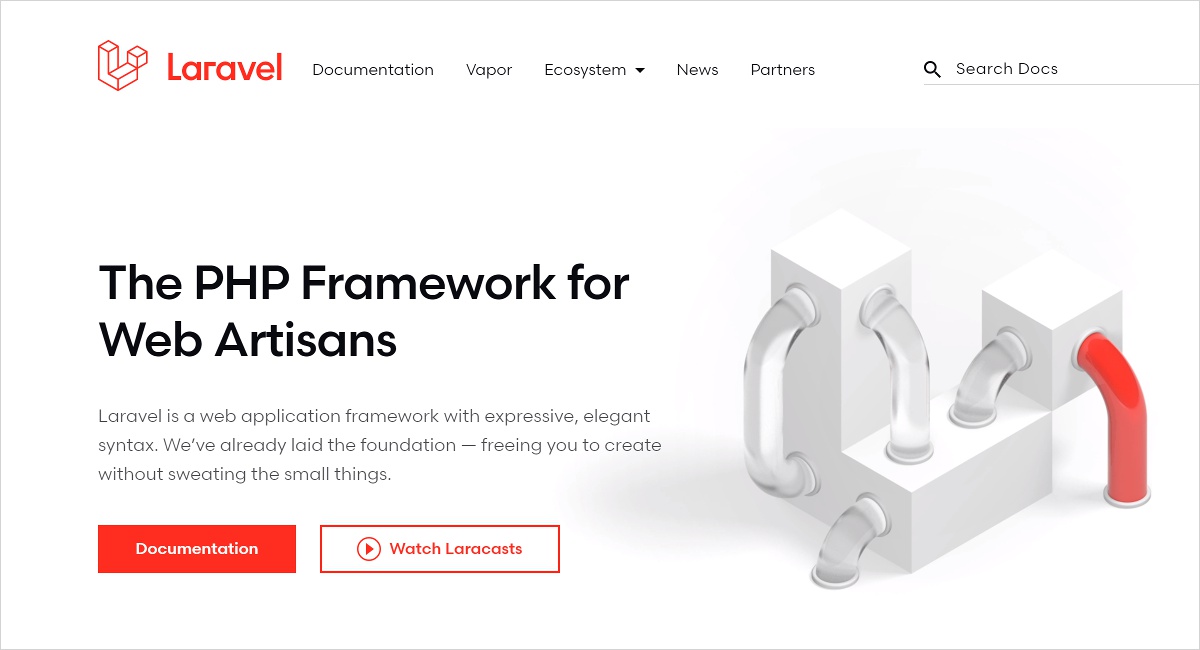
Laravel PHP Framework is one of the most likable and popular PHP frameworks. It is an open-source PHP framework which is a comprehensive framework that uses a Model View Controller (MVC) architecture to isolate the logic from the UI. Laravel was introduced in the year 2011and since then it has gained huge popularity. More so it eases your web development process to a great extent.
Features
- It comes with a built-in command-line tool called Artisan, hence, performing repetitive tasks become easier.
- It uses the lightweight templating engine known as BLADE that helps in caching, queueing, authentication, sessions, and restful routing easier.
- Laravel PHP framework supports MySQL, SQL Server, and SQLite database systems.
- It has an amazing automatic memory to remember past queries.
- Laravel can easily handle any project irrespective of its size be it a huge enterprise application or a simple JSON APIs.
- There are various web design templates to choose from.
Pros
- It works on MVC architecture.
- It provides quick authentication, session management, caching routing.
- In order to provide secure communication, Laravel uses encryption packages.
- It comes with Object Relational Mapping (ORM) feature.
- The Blade template engine gives a smooth user experience.
- Artisan helps you start quickly.
- Complete documentation.
Cons
- Laravel doesn’t work with shared hosting plans.
- A little complex for beginners.
- Steep learning curve.
2. Symfony
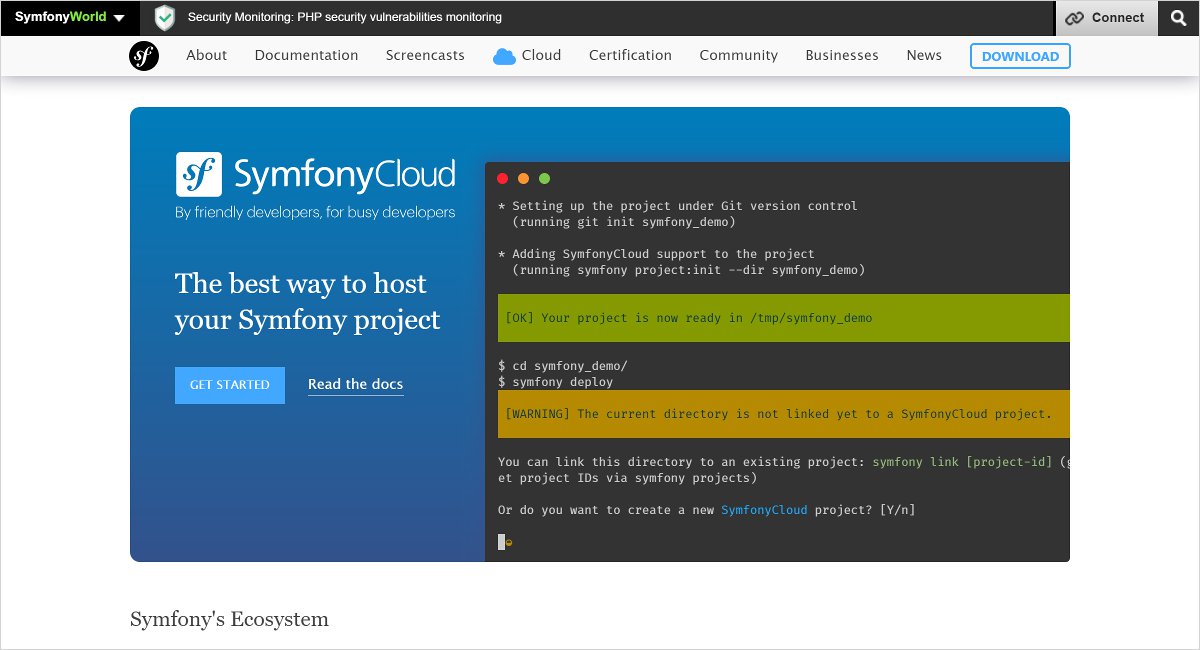
Another popular and appreciated member of PHP frameworks is Symfony. When it comes to design and maintain extensive applications, Symfony comes to the rescue. It is the best PHP Framework known for its pace as it has less repetition of codes. Symfony offers multiple database support such as PostgreSQL database, MySQL database, and SQLite, etc. The pre-built library of Symfony can be used for tasks such as templating, object configuration, authentication, form creation and much more.
Features
- Symfony is a reliable PHP framework for developing and maintaining web applications.
- It comes with several advanced features.
- Symfony can handle large data quite easily.
- Symfony developed applications are interoperable with market standards.
Pros
- Due to the presence of ByteCode Caching, you get better performance.
- Symfony is a highly flexible framework.
- It is easy to understand.
- Symfony has an extensive developer community.
- It gives you complete flexibility.
Cons
- It has a steep learning curve.
- The biggest drawback of
3. CodeIgniter – PHP Framework
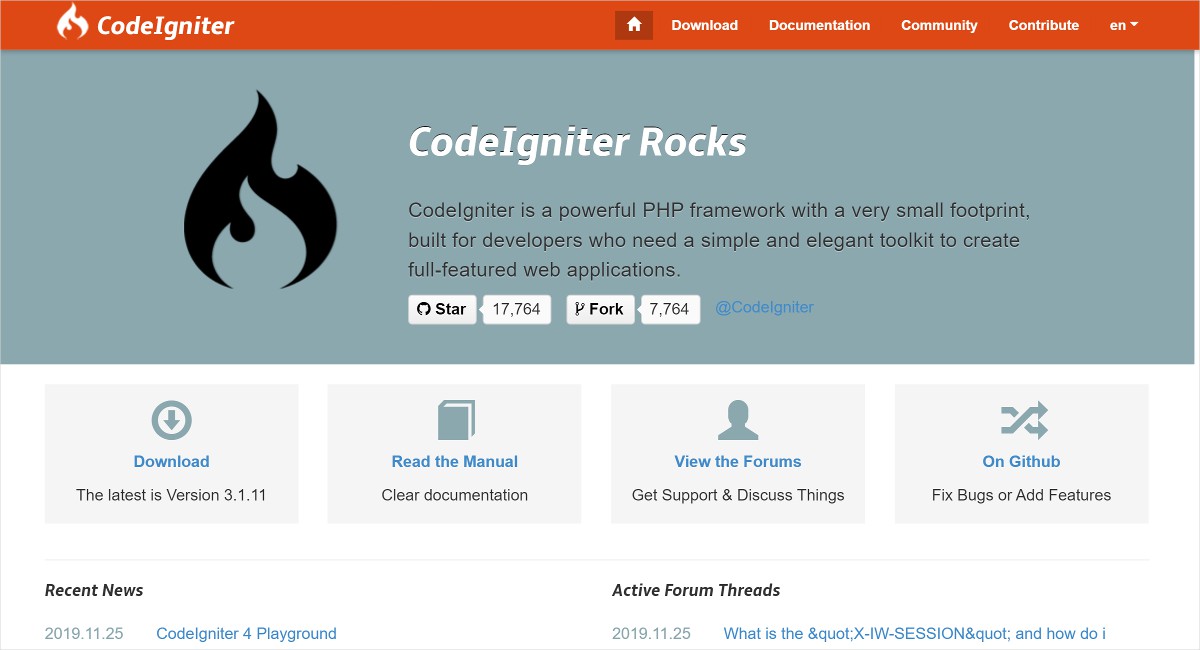
The CodeIgniter PHP framework is there in the market for more than a decade and it has gathered a huge following due to its ease of use, speed, and performance. It is a lightweight framework that is easy to install with minimal user configuration. This PHP framework is one of the best choices when it comes to version conflict because CodeIgniter works perfectly with shared and dedicated hosting platforms. Certainly, CodeIgniter is a perfect platform to create dynamic websites.
Features
- CodeIgniter is based on object-oriented programming.
- However, it uses the basic principles of MVC architecture.
- Adding third-party plugins gets simpler with CodeIgniter.
- It can easily handle difficult utilities with the help of plugins.
- It has several libraries such as form validation, unit testing, and email, etc.
- CodeIgniter supports MySQL, PostgreSQL,SQLite3
- It requires a minimum of 5.6 PHP versions to run properly. However, you can use it on 5.3.7 as well. But that is not recommended. So, you should know which PHP version you are currently using for your project.
Pros
- It is a small learning curve.
- Creating full-fledged web apps with CodeIgniter is like a piece of cake.
- You can create your own custom library.
- It is a highly flexible platform, hence, you can use it as per your needs.
- It’s a great PHP framework with small footprints.
- It requires zero configuration.
Cons
- CodeIgniter does not support REST API development.
- It does not have an in-built template engine as well.
- It does not support modularity features.
4. Yii Framework
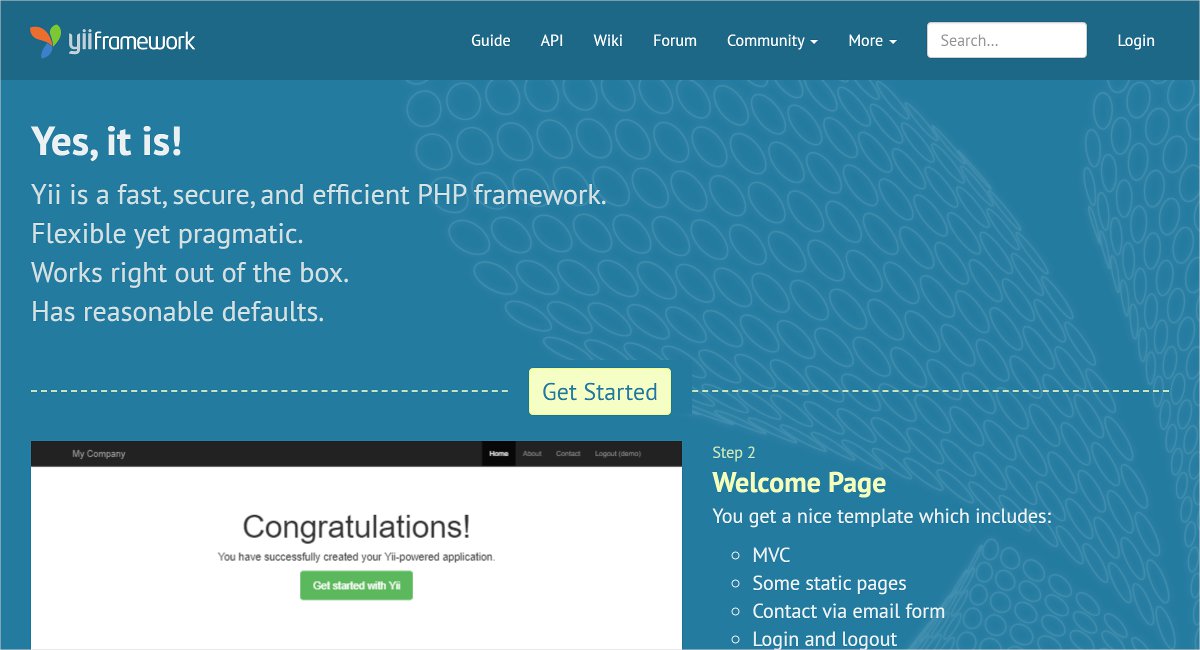
Yii is the abbreviation of ‘Yes It Is’ and in the Chinese language it means ‘simple and evolutionary’. Certainly, the beauty of Yii lies in its simplicity. It is a component-based PHP framework that helps in developing modern web applications. Yii is an ideal option for big applications because it can easily integrate with AJAX features and jQuery. The lazy load concept of Yii allows you faster web development.
Features
- Yii implements MVC architecture.
- Great support for AJAX.
- Yii is a full-stack framework
- It is one of the fastest PHP frameworks.
- Yii is easily extensible. Thus, you can work smoothly.
Pros
- It is an ideal choice to build large-scale applications.
- Huge support for third party components.
- It comes with comprehensive documentation to get you off the ground.
- Best suitable to build large-scale PHP applications.
Cons
- It can get messy easily. So, be careful with your code.
- Yii has a steep learning curve.
- The Ajax feature is not well-drafted.
5. CakePHP
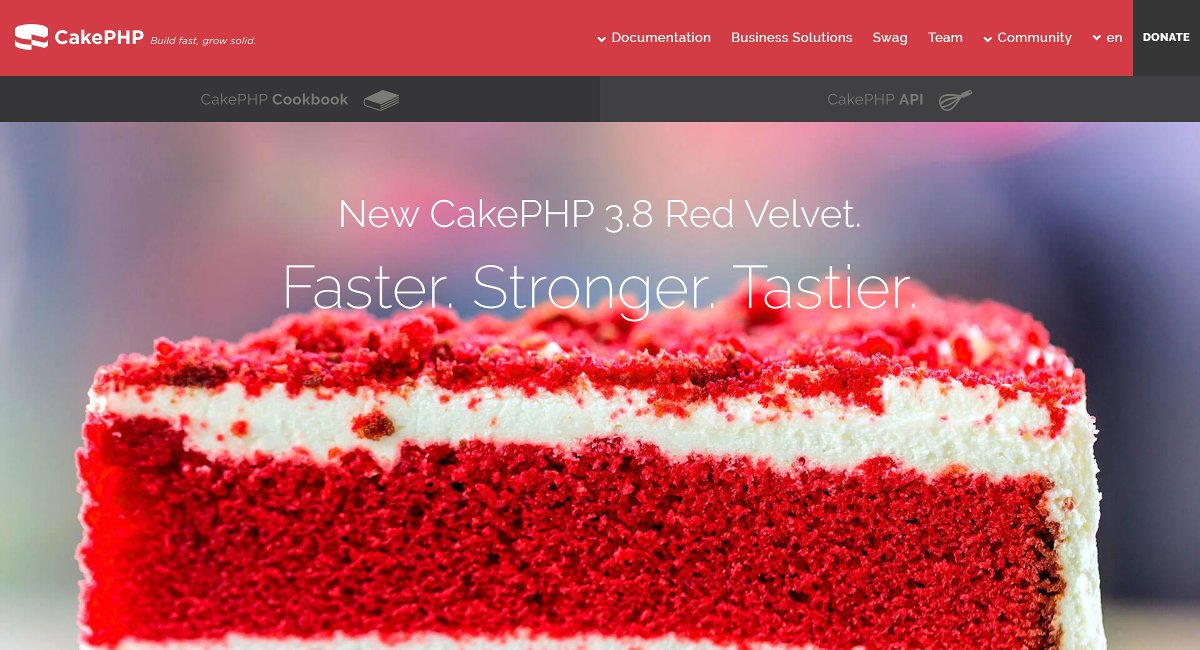
CakePHP is there in the marketplace for more than a decade now and still has an amazingly active community. It is such a PHP framework that provides you with highly secure and reliable web apps. You don’t have to deal with any complicated configuration in it, just set up the database and its done. You will get built-in security tools for XSS (cross-site scripting) prevention, input validation, Form tampering protection, SQL injection prevention, and CSRF (cross-site request forgery) protection.
Features
- CakePHP framework uses HMVC architecture.
- Routing in CakePHP is quite simpler to perform.
- You can freely use it for commercial applications.
- CakePHP comes with tons of useful functionality.
Pros
- CakePHP provides much faster performance.
- It comes with the largest community support.
- It does not have complex XML and YAML files to configure.
- Great availability of plugins.
Cons
- Not recommended to build RESTful APIs.
- CakePHP is not so suitable for large data sets.
- It doesn’t help with the data binding process.
6. Slim
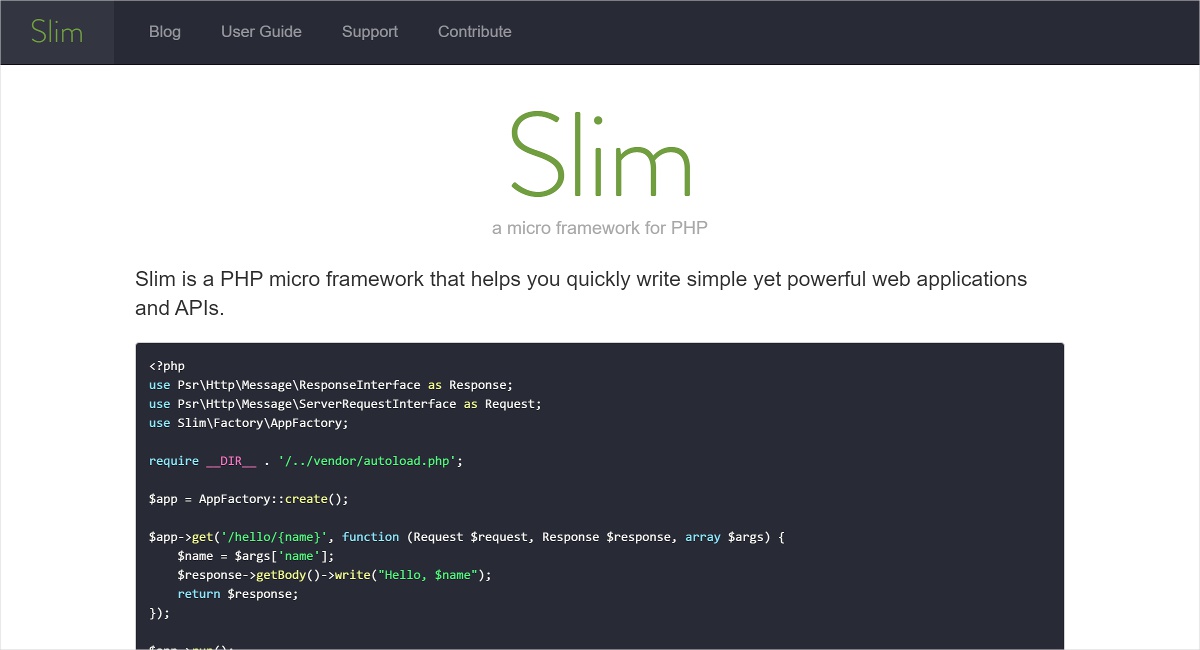
Slim is a micro PHP framework to quickly set up APIs and PHP web applications. However, Slim claims that “Slim at its core works as a dispatcher that receives HTTP requests, invokes an appropriate callback routine, and returns an HTTP response.” However, keeping a PHP cheat sheet handy is always a good practice as it helps you get through quickly.
Features
- Slim can be a perfect choice to create lightweight Restful APIs.
- Slim is an open-source platform released under MIT public license.
- It thoroughly supports code hooks for executing functions.
- It’s quite easy to maintain.
Pros
- Slim is quite simple to use both for professionals as well as beginners.
- Slim provides detailed documentation.
- You can easily integrate Slim with other third-party resources.
Cons
- It has minimal add-ons.
- It sometimes loads unnecessary PHP files.
7. Phalcon
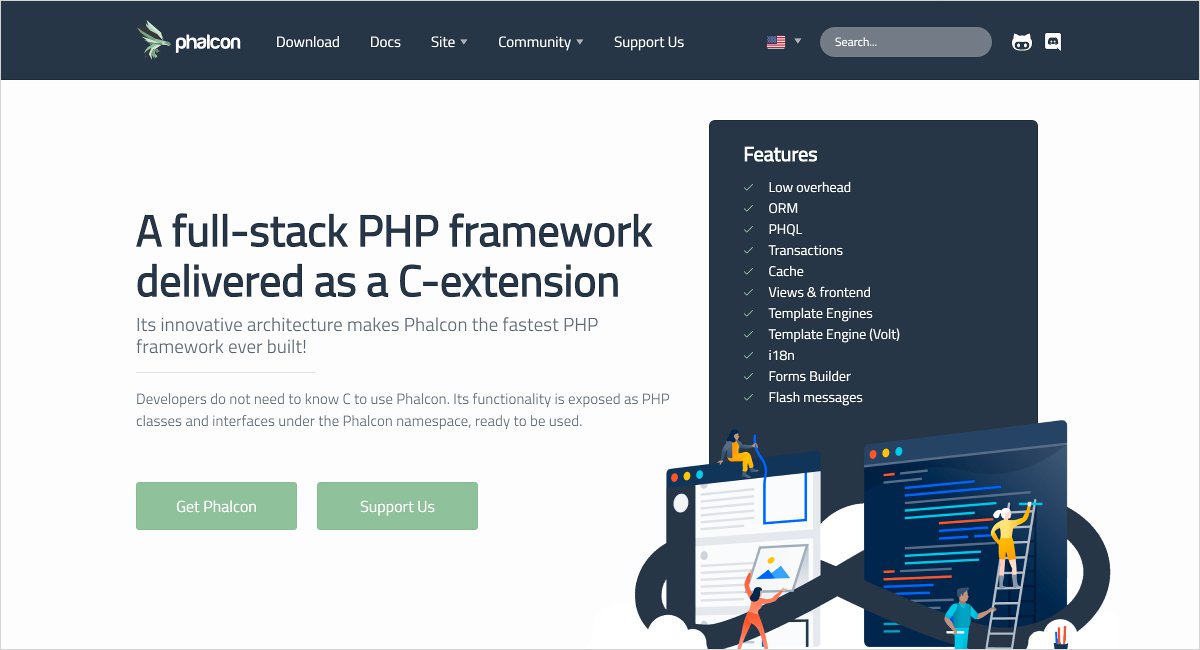
Phalcon is an open-source PHP framework available as a C extension. Like many other PHP frameworks, Phalcon is also based on MVC architecture. However, the catch is Phalcon is the first framework that implements ORM (Object Relational Mapping) in the C language. It is a beautiful amalgamation of PHP and C language.
Features
- Phalcon is highly Customizable.
- It is an open-source PHP framework.
- Phalcon can be used with any prior knowledge of the C programming language.
- Phalcon routers come with advanced routing capabilities.
- It supports MySQL, PostgreSQL, SQLite,
Pros
- It is a high-performance PHP framework.
- Phalcon consumes a few resources.
- It is a versatile PHP framework.
- It has an array of features.
Cons
- You might have to face some hard time using Phalcon on shared hosting.
- Phalcon uses the C source code.
8. PHPixie
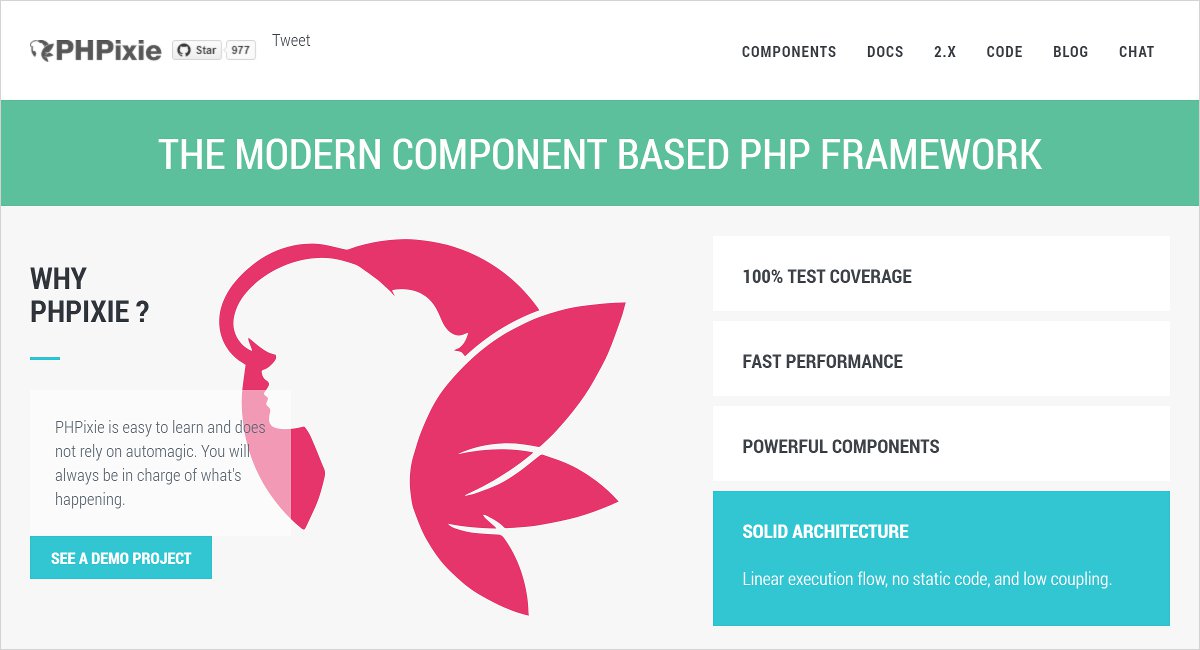
PHPixie initially started as a micro framework and has become one of the widely used full-stack PHP frameworks. This PHP framework PHPixie is also an open-source solution available that can help you get started with your PHP web page quickly. It is a lightweight PHP framework that works on the HMVC pattern.
Features
- PHPixie compiles faster and can be easily deployed.
- The routing system is really smooth.
- PHPixie components provide full test coverage.
Pros
- Easy to use PHP Framework.
- The documentation includes code samples.
- It is easy to learn.
- PHPixie is an ideal solution for both beginners as well as professional developers.
Cons
- Very few modules are available.
- It offers fewer modules as compared to other PHP frameworks.
9. Laminas (Zend Framework)
Notably, Laminas which was earlier known as Zend Framework is an open-source object-oriented PHP framework which is popularly known for its reusable components and MVC framework. And Laminas is not managed by the Linux foundation. It comes with a wide array of libraries which allows the developers to choose the required components, enhance the performance, and get rid of unnecessary overhead. It is one of the best PHP frameworks because it focuses on security and offers powerful features to make sure the development process is smooth and the applications are secure. Laminas is a good PHP framework for anyone looking for front-end support and needs a framework with wide community support.
Features:
- It provides modular architecture.
- MVC support.
- Database support.
- Various security features.
- Caching mechanism.
- Integration with third-party libraries.
Pros:
- Supports extensive database
- Provides reusable components
- Modular and customizable components
- Robust security features
- Great documentation
Cons:
- Great complexity even for small projects
- Requires efforts to maintain the code
10. Fat-Free Framework
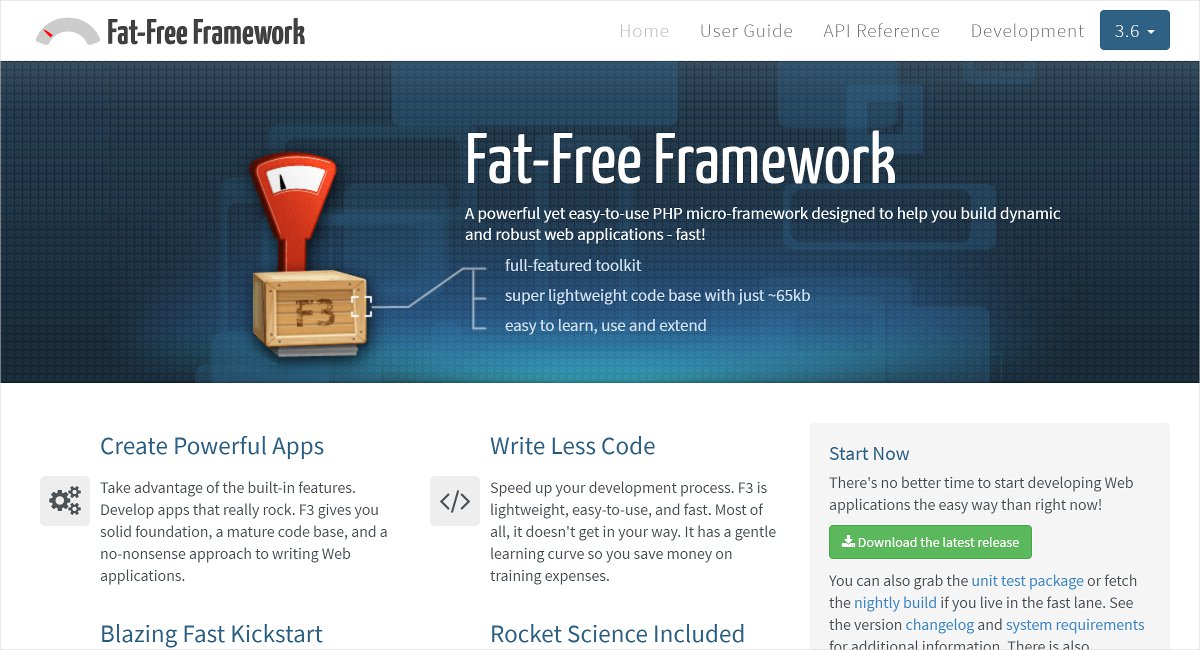
Fat-Free Framework is a robust PHP micro-framework that can help you build dynamic web applications. Certainly, Fat-Free Framework is a lightweight PHP framework. Various features like multilingual application, built-in code highlighting, catch engine, etc makes it the best PHP framework to use. Hence, no matter if you’re a beginner or a seasoned professional, you will be able to get started in minutes.
Features
- Fat-Free Framework support MySQL, PostgreSQL, SQLite, Sybase, MongoDB.
- It has its own blazing fast Flat File DB to offer you.
- It comes with the power of ORM for data abstraction.
- Fat-Free Framework constantly performs DNSBL checks in order to provide spam and DoS attacks protection.
- It has a fast and simple template engine.
Pros
- Fat-Free Framework is an easy-to-use platform.
- It gives a wonderful user-experience to both professional developers as well as beginners.
- It doesn’t have any unnecessary installation procedures.
- Superb uptime.
- Extensible.
Cons
- It lacks front-end stack support.
- The ORM does not support joints.
- limited community support.
11. Zend Framework
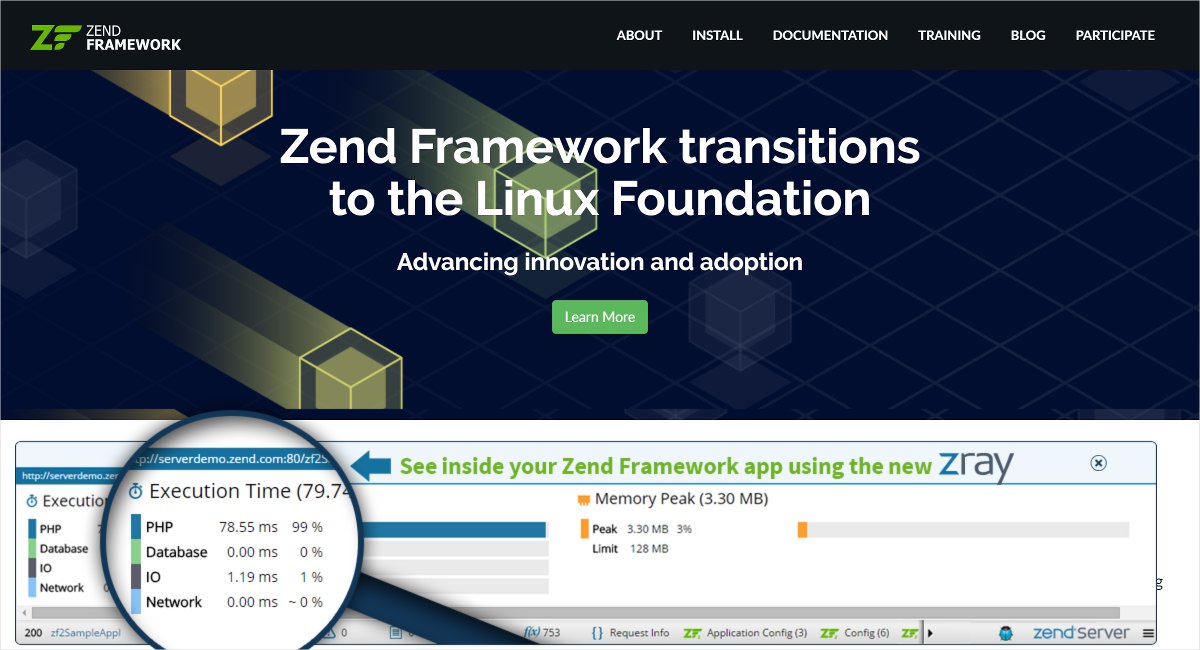
Zend PHP Framework is a robust open-source object-oriented PHP framework. It is not recommended for the small level projects. And excellently work for heavier projects. It is attached to big brands such as Microsoft, Adobe, and Google. Zend framework ensures security and high performance. You will get 60+ packages for professional development and over 480 million active installations.
Features
- Zend PHP Framework offers high-performance MVC implementation.
- It comes with a simple use of data abstraction and validation.
- It is an object-oriented framework.
- You will get a light-weight component library with Zend PHP Framework.
Pros
- Support for multiple languages.
- Zend PHP Framework is simple to use.
- Support multiple databases.
- Totally SEO-friendly design.
Cons
- Not suitable for small scale projects.
How Can You Choose the Best PHP Framework?
With so many options for the PHP framework, it can be difficult to choose the best one for your project. So, while choosing the right PHP framework there are a few factors that you can check and make the right choice. Here is what you need to know:
A full-stack PHP framework allows the developers to a complete range of web development processes, whether it is the user interface to data storage at the backend. While micro-frameworks offer fewer set of features but are beneficial for developing small apps. So, while choosing the best PHP frameworks you must consider this as well.
- Learning Curve: Every framework has a different learning curve, so it will take time to understand the framework. Again a comprehensive documentation makes it easier to understand the framework, and can help flatten the learning curve and also reduce the time it takes to understand it.
- Popularity: If more developers are using a specific framework it means the framework is more likely to have huge community support. That also means a stable and supportive community.
- Features: Choosing the best PHP frameworks also widely depends upon the type of project you are going to undertake. So having more features means it is going to be more beneficial as it is most likely to help you meet unique requirements.
- Security: A good PHP framework should offer good security against vulnerabilities and secure web applications. They should provide cross-site scripting, cookie attack prevention, and other security features.
So, which is the Best PHP Framework for you?
Selecting the best PHP framework, however, can be a bit challenging at times. And in order to make the selection process easier for you, I have included the best PHP frameworks in this tutorial. So, it’s your turn to decide which PHP framework is best for your project. However, the selection is completely dependent on your project’s complexity and requirements. On the other hand, all the aforementioned PHP frameworks are highly useful and versatile that can surely serve your purpose. Whereas, considering their capabilities can surely help you decide. So, whichever PHP framework you think can serve you better, you can choose. In fact, if you know any other PHP framework other than mentioned in this list, then do let me know in the comments below.
Build a Stunning Website in Minutes with TemplateToaster Website Builder
Create Your Own Website Now
Frameworks are for better development work, it helps for making the best websites, thanks for posting.
I am working with Laravel framework, I love this because it remembers my all past queries as well.
But according to me, it is a bit difficult to understand and learn for beginners rather than other frameworks.
Can you suggest which framework is the best and which one is used the most?
All framework has its own pros and cons but I love to use Codignator, because it is easy to understand and it follows the basic principle MVC.
Codignator is easy to understand and it follows the basic principle MVC as well as has several libraries.
I am usually prefer Zend Framework big projects because it is more reliable and perfect for it.
I need to make a project which is similar to amazon for that which framework I can use so that I can make the perfect system?
Laravel is the best which is an open source framework and most likely used by the developers.
Laravel and CodeIgniter both are best php frameworks and having almost same function.
Hope you are having nice day!! Reading your blog came to know many new frameworks of PHP. I found your article very impressive and informative. There many more PHP frameworks which are also very beneficial to use for website development, I have mentioned them below:
1. Fat-Free Framework (F3)
2. Phalcon
3. Slim
4. Zend Framework (Laminas)
5. CodeIgniter 4
These are some of the other frameworks which can also be used. PHP website development is not an easy task if you want to develop PHP website then one need to hire php website developers which are dedicated and expeirenced team like Alakmalak Technologies. They are very good PHP website development company providing the best work at affordable rates.
Hello comrades,
If you want something fast, modern, secure and easy to learn, go for “Nicotine Framework for PHP and MySQL”.
Ricky.
What about Nicotine Framework for PHP and MySQL? It is easy to learn and use.